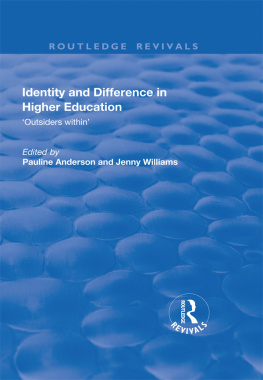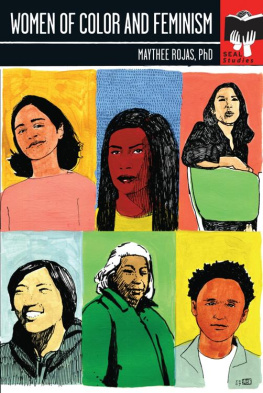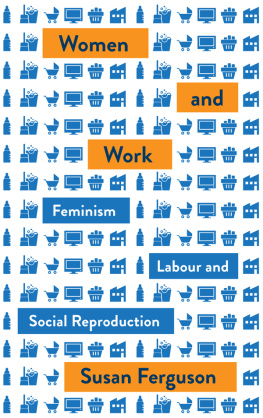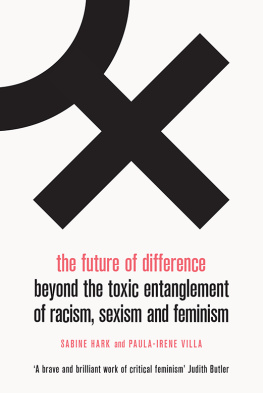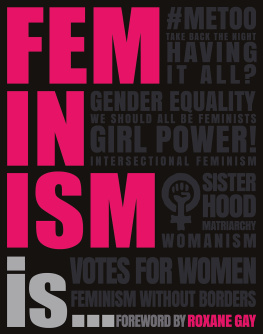Feminism, Identity and Difference
Editor
SUSAN HEKMAN
First published in 1999 by
FRANK CASS PUBLISHERS
Published 2013 by Routledge
2 Park Square, Milton Park, Abingdon, Oxon OX14 4RN
711 Third Avenue, New York, NY, 10017, USA
Routledge is an imprint of the Taylor & Francis Group, an informa business
Copyright 1999 Frank Cass & Co. Ltd
British Library Cataloguing in Publication Data
Feminism, identity and difference
1. Feminism 2. Gender identity
I. Hekman, Susan J.
305.41
Library of Congress Cataloging in Publication Data
Feminism, identity, and difference / edited by Susan Hekman.
p. cm.
Includes bibliographical references and index.
1. Feminism. 2. Feminity. 3. Feminist theory. 4. Women--Identity. I. Hekman, Susan J.
HQ1150.F454 1999
305.43--dc21
99-31186
CIP
ISBN 13: 978-0-714-65017-3 (hbk)
ISBN 13: 978-0-714-68074-3 (pbk)
This group of studies first appeared in a Special Issue on Feminism, Identity and Difference of CRISPP 2/1 (Spring 1999) ISSN 1369-8230
Published by Frank Cass
All rights reserved. No part of this publication may be reproduced, stored in a retrieval system or transmitted in any form, or by any means, electronic, mechanical, photocopying, recording or otherwise, without the prior permission of the publisher of this book.
Contents
Susan Hekman
Nancy J. Hirschmann
Shane Phelan
Eloise A. Buker
Rajani Sudan
This special issue of CRISPP focuses on a set of issues that are at the forefront of feminist thought in the late 1990s: identity, difference, and their implications for feminist politics. As feminism moves into an era in which differences among women, the multiple identities of women, and identity politics are at the centre of feminist discussions, new approaches, methods, and politics are called for. Woman as a universal identity that informs feminist theory and practice is no longer a viable basis for feminism. Yet precisely what can replace woman is still unclear. Multiple identities and differences solve some of the questions entailed by woman, yet raise others. The papers in this volume represent attempts to sort through some of these problems and suggest solutions.
My contribution, Identity Crises: Identity, Identity Politics, and Beyond, offers an overview of the problems created by the contemporary feminist focus on identity and difference. I argue that although the question of identity is central to feminism, identity politics has created a set of contradictions for feminist theory and practice that are intractable. I advance two theses. First, feminists must develop a theory of the social construction of identity specifically tailored to feminist purposes. Second, feminists must move beyond identity politics. Bringing the issue of identity into feminist or any other politics has resulted in the reification of identity. Against the proponents of identity politics, I argue that feminism should eschew identity in the political arena because it harks back to the politics of liberalism/modernism.
Nancy Hirschmanns article, Difference as an Occasion for Rights, is an attempt to do what many feminists have claimed is impossible: reconcile feminism and liberalism. In a highly nuanced argument, Hirschmann contends that liberalism is a diverse ideology, offering multiple possibilities for the definition and redefinition of its central concepts. Specifically, she argues that one of liberalisms central concepts, rights, can be redefined to allow for the kind of group rights that feminism requires. Liberalism, she claims, is the framework in which political battles are carried out; it does not pre-determine the result. Hirschmanns conclusion is that redefining rights through care provides for a concrete universality that reflects feminist values.
Shane Phelans Bodies, Passions, and Citizenship is much less sanguine about the possibility of integrating American political ideology with the others (including women) that it has marginalised. Focusing on the conception of the body and the body politic in American Republican thought, Phelan argues that this body is not just male, but masculinist and the bearer of what she calls phallic agency. For this body politic, any deviation from the generic category is a threat. The task for these others, she argues, is to find ways of penetrating this phallic masculinity. The strategy she advocates is devising micro-challenges to that concept by placing pressure at weak points in the edifice.
Eloise Buker assumes, with Phelan, that liberalism must be displaced rather than redefined. But for Buker, the tools are already at hand. Her thesis is that the emerging postmodern self is very similar to the feminine self as it has been defined in the modern political tradition. Bukers task is to demonstrate that this postmodern self is a responsible, ethical citizen, despite its fragmentation and fuzzy boundaries. She accomplishes this by detailing the ethical implications of the postmodern self. This self, embodied most clearly in the modern female, brings care, responsibility, and relatedness to the political arena, forging a new conception of the citizen for the postmodern world.
Rajani Sudans Feminising Race examines the question of identity and its re-articulation from a radically different perspective. Questioning whether the re-articulation of identity originates in the abstract theorising of academics, Sudan suggests that we look instead to popular culture. Her insightful analysis of the popular film Disclosure suggests that the contemporary re-articulation of identities of race and gender are a product of our new understanding of the ontology of labour. In the global marketplace, the foreign and the exotic are displaced and conflated with the feminine.
SUSAN HEKMAN
University of Texas at Arlington
Identity Crises: Identity, Identity Politics, and Beyond
SUSAN HEKMAN
In 1988, Signs published an article by Linda Alcoff, Cultural Feminism Versus Post-structuralism: the Identity Crisis in Feminist Theory. In her article, Alcoff addresses the crisis in feminist theory that dominated feminist thought in the late 1980s: the conflict between cultural feminism and post-structuralism. This dispute revolved around the definition of woman in feminist theory and practice. The cultural feminists argued for an essentialist definition of woman, the post-structuralists rejected the possibility of any definition. Alcoff attempts to define a compromise between these two extremes, arguing for a concept of the subject as a dialectical interaction between the inner world of subjectivity and the outer world of social forces.
Alcoffs article has become an important touchstone in the debate over the concept of woman that has occupied feminist theory in the 1980s and 1990s. At stake in this debate is nothing less than the definition of a new paradigm for knowledge and subjectivity, a paradigm that displaces the masculinist assumptions of modernist thought. Alcoffs reference to identity crisis in the title of her article indicates the importance of the issue for feminist theory. In the course of her article, however, Alcoff briefly discusses another sense of identity that, in the late 1980s, was coming to the forefront in feminist theory and practice: identity politics. She defines identity politics as taking ones identity as a political point of departure, a motivation for action and a delineation of ones politics (Alcoff, 1988, pp.4312). Alcoff argues that although identity is a necessary point of departure for the subject, it must always be conceived as a construction, not a fixed entity. She thus argues that identity politics is an offshoot of the post-structuralist rejection of a fixed, essential identity. Identity politics, she concludes, has the effect of problematising the connection between identity and politics (Alcoff, 1988, pp.4323).




